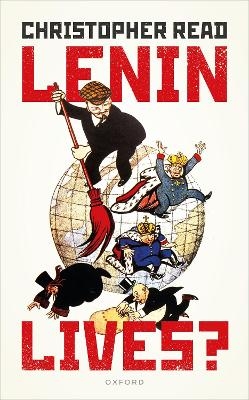
Lenin Lives?
Oxford University Press (Verlag)
978-0-19-886608-4 (ISBN)
Lenin lived a controversial life and has had a deeply controversial reputation in the centenary since his death (21 January 1924) His rise from a conventional, educated, provincial, and middle-class background to become not only the leader, even dictator, over the largest country on earth, is dramatic and vital in itself. But it is only part of the story. Even after his death, he was unchallenged as the chief inspirer of a disparate world revolutionary movement which rocked the dominant capitalist world for most of the twentieth century. His admirers and disciples included major intellectual and cultural figures, such as Brecht, Picasso, Sartre, Franz Fanon and Pablo Neruda; disparate radical activists and revolutionaries such as Ho Chi Minh, Joseph Stalin, Mao Ze dong, Fidel Castro, Che Guevara, Josip Broz Tito, terrorist groups such as the Red Brigades and Baader-Meinhof, and many liberation movements.
Despite this, his work and influence have often been written off as no longer relevant, and many today consider this to be so. Lenin has, they claim, had his day, even though he is still revered in China, the world's most populous country. However, Lenin, like his mentor Marx, has had a tendency to rise from apparent decline and oblivion to renewed force and influence.
This study examines the key elements of Lenin's life and career, the consolidation of his ideas into the doctrines of 'Leninism', the influence of Leninism in promoting revolutionary movements around the globe, and the currently disputed issue of whether his ideas still have any relevance today. In particular, while considering his views on the role of the revolutionary party, often seen as the centrepiece of his theory and practice, this account identifies the root of Lenin's global influence in his opposition to capitalist imperialism and as a bedrock foundation for the opposition of many to fascism and associated ideologies. While recognizing that Lenin's reputation has reached its lowest point, not least in his home country where his legacy is reviled by Vladimir Putin and other contemporary leaders, the book concludes by weighing up the contemporary arguments of those who believe that Lenin still lives.
Christopher Read's scholarly work has focused on the cultural, social and political history of modern Russia with a central emphasis on the revolutions of 1917 and the wider period from 1900-1941. He also has a particular interest in the social and political thought of the Russian intelligentsia from its origins to the present. Read studied at Keele, Glasgow and Leningrad Universities and the London School of Economics, and taught in the History Department at Warwick from 1973 to 2019 and conducted research at Harvard, Columbia, Stanford, Berkeley, Leningrad/St.Petersburg, Moscow, and the Soviet and Russian Academies of Science. Read is currently Emeritus Professor of History at the University of Warwick.
Introduction
Part One: Lenin before Leninism
Part Two: Lenin as Icon and Inspiration: Leninism after Lenin
Bibliography
| Erscheinungsdatum | 13.01.2024 |
|---|---|
| Zusatzinfo | 16 |
| Verlagsort | Oxford |
| Sprache | englisch |
| Maße | 140 x 223 mm |
| Gewicht | 394 g |
| Themenwelt | Geschichte ► Allgemeine Geschichte ► Neuzeit (bis 1918) |
| Geschichte ► Allgemeine Geschichte ► Zeitgeschichte | |
| Geisteswissenschaften ► Geschichte ► Regional- / Ländergeschichte | |
| ISBN-10 | 0-19-886608-9 / 0198866089 |
| ISBN-13 | 978-0-19-886608-4 / 9780198866084 |
| Zustand | Neuware |
| Informationen gemäß Produktsicherheitsverordnung (GPSR) | |
| Haben Sie eine Frage zum Produkt? |
aus dem Bereich


